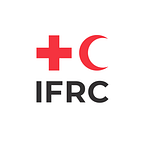One night, back in mid-May, dozens of people crossed in pitch darkness from Belarus into Lithuania.
Hundreds more followed in the next weeks, leading the Lithuanian government to declare a state of emergency.
By 14 August, the country had received some 4,100 migrants since the beginning of 2021, about 41 times more than the average number of arrivals in previous years.[1] The majority come from Iraq, Syria, Iran, the Democratic Republic of Congo and Cameroon, and have submitted asylum applications.
With support from the International Federation of Red Cross and Red Crescent Societies (IFRC), Lithuanian Red Cross is at the heart of the response to the crisis. Local teams are providing emergency assistance to those in need, including basic necessities, legal advice and psychosocial support.
On arrival, migrants are tested for COVID-19 and quarantined for ten days. After that, they are transferred to accommodation centres. Most people are hosted in the foreigners’ registration centre in Pabradé, but the capacity of this facility is almost exhausted. Temporary camps have also been set up in abandoned school buildings and other facilities across the country, as well as along the border.
Nearly 30 per cent of the people who’ve recently crossed into Lithuania from Belarus are women, and more than a quarter are children.
Some of those arriving are particularly vulnerable — including older adults, pregnant women, unaccompanied minors and people with disabilities.
Lithuanian Red Cross teams are working tirelessly to meet migrants’ needs.
In July, IFRC released more than 338,000 Swiss francs from its Disaster Relief Emergency Fund (DREF) to help Lithuanian Red Cross support up to 4,000 migrants with medicine, clothes, hygiene kits, personal protective equipment, family reunification services and psychosocial support.
On the ground, more than 250 volunteers and 30 staff members of Lithuanian Red Cross are regularly visiting border checkpoints and reception centres to monitor conditions and provide humanitarian aid. This includes the distribution of relief items and toys for children.
As health services in the camps are very limited, people are accompanied to hospital by volunteers who cover medical bills, purchase prescribed drugs and replenish first aid kits.
Lithuanian Red Cross is also offering legal assistance, orientation sessions and individual consultations, using interpreters to provide information to people in their native languages.
In addition, volunteers are organising activities for children and helping migrants reconnect with their loved ones through mobile phones, SIM cards and Restoring Family Links (RFL) services.
Birgitte Bischoff Ebbesen, IFRC’s Regional Director for Europe, visited Lithuania in August. She witnessed first-hand the situation along the border and the ongoing challenges:
“People are crossing the border with just the clothes on their backs. They need essential items and services wherever they are.
“It is critical that all migrants and asylum seekers have access to relevant information about their rights and opportunities, and they should also be provided with access to fair procedures and protection from refoulement,” she said.
By Ainhoa Larrea, IFRC
[1] Lithuanian Bureau of Statistics
